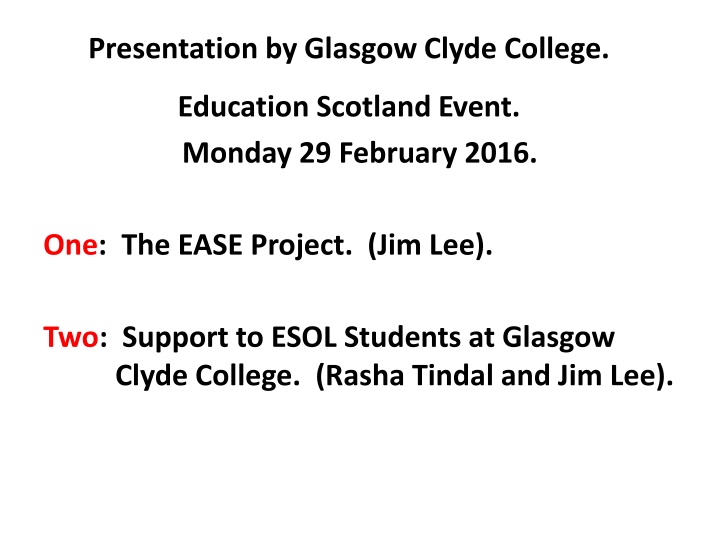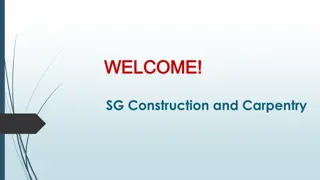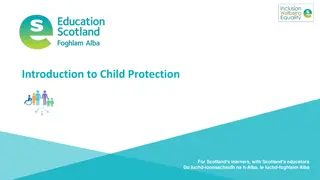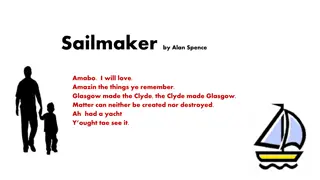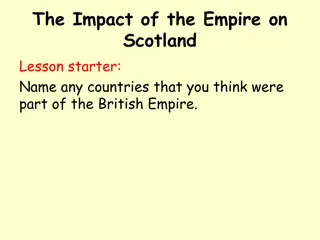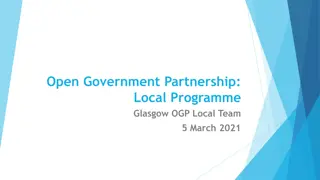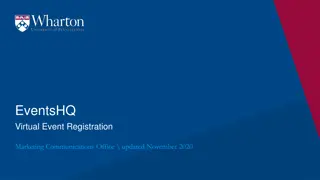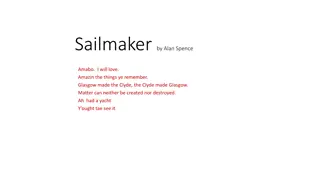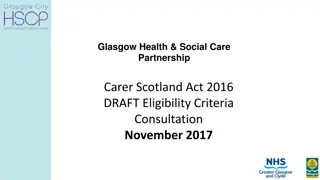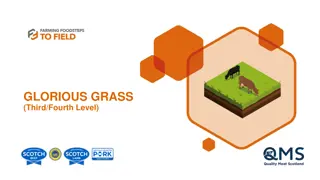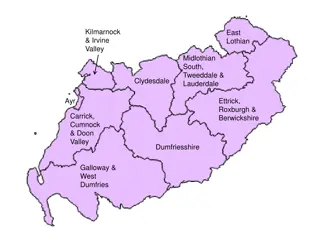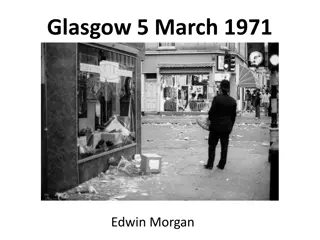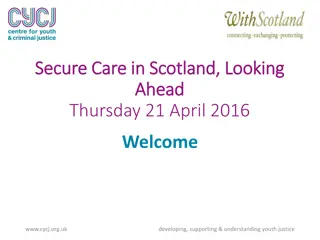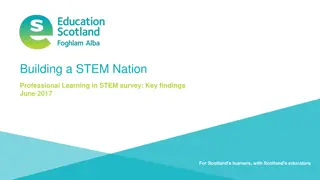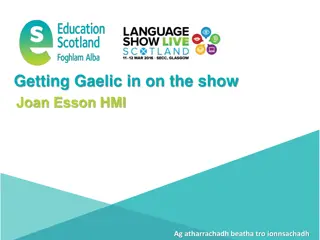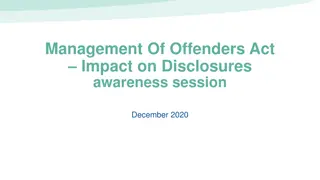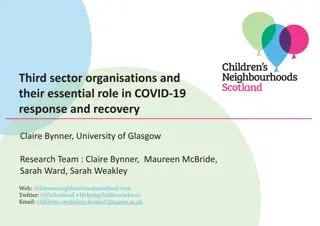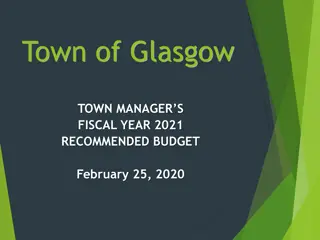Insights from Glasgow Clyde College Education Scotland Event
The presentation by Glasgow Clyde College at the Education Scotland Event highlighted the EASE Project, aimed at assessing and supporting ESOL students from specific areas in the city. Over 392 people were assessed in various venues, with a near-equal gender split. The project also focused on countries of origin, age ranges, and ESOL levels to tailor support services effectively.
Download Presentation

Please find below an Image/Link to download the presentation.
The content on the website is provided AS IS for your information and personal use only. It may not be sold, licensed, or shared on other websites without obtaining consent from the author.If you encounter any issues during the download, it is possible that the publisher has removed the file from their server.
You are allowed to download the files provided on this website for personal or commercial use, subject to the condition that they are used lawfully. All files are the property of their respective owners.
The content on the website is provided AS IS for your information and personal use only. It may not be sold, licensed, or shared on other websites without obtaining consent from the author.
E N D
Presentation Transcript
Presentation by Glasgow Clyde College. Education Scotland Event. Monday 29 February 2016. One: The EASE Project. (Jim Lee). Two: Support to ESOL Students at Glasgow Clyde College. (Rasha Tindal and Jim Lee).
One: REMIT OF THE EASE PROJECT. To assess potential ESOL students from two postcode areas in the South East area of the city; G41 and G42. To place potential ESOL students in a college or community based ESOL class. To provide a pastoral support service to ESOL students to help them maintain their studies.
1. NUMBER OF PEOPLE ASSESSED. Target for the financial year 2015/2016: to assess approx 400 people at local community venues. 21 April 2015 - 17 December 2015. 392 people assessed. GENDER. Female: 195 (49.5%). Male: 197 (50.5%). Almost equal gender split. Similar pattern to last year.
2. ASSESSMENT VENUES Six community venues in the G41 and G42 postcodes. Four Public Libraries. Pollokshields (6.4). Gorbals (18.5). Govanhill (8.2). Langside (9.6). Two Community Centres. Nan McKay Hall (8.6). Pollokshields Community Centre (5.8). Brackets = the average no. assessed per 2 hr. session.
3. COUNTRIES OF ORIGIN. 1. Pakistan (62 people). Pakistan / UK (5). 2. Eritrea (35)* No Eritreans assessed in period 1. Similar pattern to last year. 3. Sudan (34)*. Two Sudanese assessed in period 1. Similar pattern to last year. 4. Iran (31). Iran / Kurd (2). 5. Syria (25). Poland (13). Afghan, Slovenia (12). Italy (11). China (10). 25 countries (2 to 10 people). 17 countries (1 person only)
4. AGE RANGES. 392 people in 10 age ranges from 16 years to 60+ years. 21 to 25 years: 71 people (18%). 26 to 30 years: 99 people (25%). 31 to 35 years: 63 people (16%). 36 to 40 years: 40 people (10%). 41 to 45 years: 34 people (8.5%). 202 people (51%) are aged 26 to 40 years. There is a general upward trend towards the older age ranges. * Most Eriteans and Sudanese are aged 16 to 20 yrs and 21 to 25 yrs.
5. ESOL LEVELS. 392 people were assessed across 12 ESOL Levels. Access 2: 115 people. (29%). Access 2 Lits (Stage 2): 92 people. (23%). Access 3: 64 people. (16%). Intermediate 1: 40 people. (10%). Access 2 Lits (Stage 1): 34 people. (8.6%). 305 people (77%) were assessed at Access 3 level and below. There is a general downward trend towards the lower ESOL levels.
6. WHERE DO PEOPLE LIVE? In 35 postcodes from a total of 49 in the city. Top 3 postcodes. G42 (92). G41 (73). G5 (28). 20 + people. G51 (23). G44 (22). 10 to 20 people. G45 (15). G43 (14). G31 (11). G32 (10). 5 to 10 people. 65 people from 9 postcodes. Under 5 people. 31 people from 15 postcodes. [8 others]. Postcodes G41 and G42 perform well (165 people or 42%). Coterminous postcodes perform fairly well. Most Asylum Seekers live in areas with hostels (G31. G32).
7. ASYLUM SEEKERS COME FROM OVER 68 COUNTRIES. Top 5 Rankings 1 Glasgow Refugees Eritrea Glasgow Asylum Seekers China UK Asylum Seekers Eritrea 2 Pakistan Sudan Pakistan 3 Nigeria Syria Iran 4 Iran Syria Iran 5 China Eritrea Albania Source: Glasgow City Council. Analysis of Census data.
Two: Support to ESOL Students at Glasgow Clyde College. Support can be at 3 distinct levels. Low level of support . Medium level of support. High level of support.
1. Low level of support . Letters, Forms and Phone Calls. Energy, Utility and other Bills. Funding Support / Bursary / Travel Costs.
2. Medium level of support. Nursery and Childcare. DWP / Jobcentre Plus Benefits. Housing Benefit, Council Tax. Housing Issues, Repairs. Financial Issues: Bank Accounts, Debt. Tax.
3. High level of support. Physical and Mental Health Issues. Evictions and Homelessness. Poverty and near Destitution. Home Office / Immigration. Personal Relationships.
